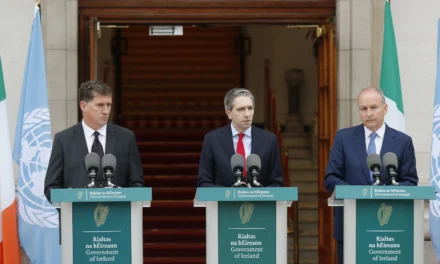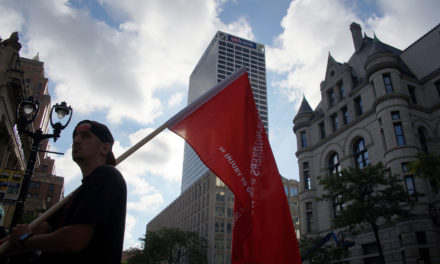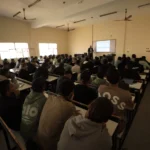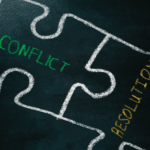Workers put the finishing touches on the stage at the annual American Israel Public Affairs Conference in Washington in March 2015. (Photo: Pete Marovich/European Pressphoto Agency)
Last month, Seth Moulton, a Democratic Representative in Massachusetts running to oust Ed Markey from the Senate, announced that he would stop accepting American Israel Public Affairs Committee (AIPAC) donations and return the money he had previously received from the group.
The move raised eyebrows, as Moulton is certainly not a dovish politician. In addition to being a longtime supporter of Israel, the former Marine pushed for the Houthis as a terrorist organization and refrained from criticizing the Trump administration’s June strikes on Iran.
Moulton’s move makes him the fourth House member to reverse course on AIPAC donations, joining Reps. Morgan McGarvey (D-KY), Valerie Foushee (D-NC), and Deborah Ross (D-NC).
It’s unclear whether these decisions mark a sea change among Democrats or a mere rhetorical shift. In the case of Moulton, his statement specifically references his disagreements with Prime Minister Benjamin Netanyahu, effectively leaving the door open to return to the lobbying group if Israel’s government changes. Just weeks after his big announcement, a source familiar with the situation told Jewish Insider that Moulton had courted AIPAC for a campaign endorsement and only chose to publicly reject the organization when it couldn’t guarantee one.
However, it’s undeniable that criticism of the powerful lobbying group has gained traction in the mainstream. In recent weeks, Governors Josh Shapiro and Gavin Newsom (both Democratic presidential hopefuls) have both been pressed about the organization.
These developments have not been restricted to one side of the aisle. In recent months, the lobbying group has been criticized, not just by popular right-wing pundits like Tucker Carlson, but by Republican Congress members like Marjorie Taylor Greene and Thomas Massie.
Recently, AIPAC published a short video insisting that its lobbying efforts ultimately benefit Americans, a clear rebuttal to recent Israel criticism emanating from “America First” conservatives.
“Funded by Americans. Directed by Americans. Strengthening an alliance that benefits America!” reads the organization’s pinned tweet, which features the video.
“The AIPAC base is basically the right-wing now, and they’re losing them too,” says Mondoweiss founder Phil Weiss, who has been covering the Israel Lobby for decades. “AIPAC used to be able to speak to both Republicans and Democrats, and I think that’s over. They’re fragmented.”
Eli Clifton, a senior advisor and investigative journalist at Responsible Statecraft, cites the demise of the Oslo Accords, the post-9/11 “War on Terror,” and the 2007 book The Israel Lobby and U.S. Foreign Policy by political scientists John Mearsheimer and Stephen M. Walt as flashpoint moments, but notes that the rapid deceleration of AIPAC’s image stems from the genocide in Gaza.
“Something has definitely changed recently, and it’s clearly because of Gaza,” Clifton told Mondoweiss. “Mainstream media has not covered it to the degree they should be, but people see it on their phones, they see it on social media. This has been one atrocity after another,” he added. “It’s a genocide and the Israelis and the United States have been unable to conceal it.”
Polling has consistently lined up with Clifton’s assertion. A September survey from The New York Times and Siena University found that just 34% of Americans side with Israel, compared to 47% who backed the country in the immediate aftermath of October 7. “Nearly two years into the war in Gaza, American support for Israel has undergone a seismic reversal,” declared the Times in an article on the poll.
Polling on AIPAC and the wider Israel Lobby has reflected these trends. An August Arab American Institute (AAI) poll found that candidates who receive support from pro-Israel lobbying groups are more likely to lose support among American voters than to gain it.
Some candidates are already beginning to lean into this reality. Former New York state legislator Michael Blake has made the lobbying group a central focus of his primary challenge against Rep. Ritchie Torres.
“Ritchie Torres cares more about Bibi than he cares about the Bronx, more about AIPAC than he does about your academics,” he declared in his campaign launch video.
Blake is a former vice chair of the Democratic National Committee who had a close relationship to AIPAC, but his reversal on the issue, along with Zohran Mamdani’s recent mayoral victory in New York City, shows that public sentiment is shifting.
Will any of these facts actually impact AIPAC’s ability to wield power in U.S. elections?
AAI co-founder and author James Zogby, who has organized around Palestine within the Democratic Party for years, told Mondoweiss that it’s hard to gauge the lobbying group’s long-term future based on the public statements of Democrats and noted that the organization is connected to a number of pro-Israel individuals who spend directly on elections.
“It’s not clear what the longer-term consequences of this will be, because I am sure that there will be many other ways to skin this cat,” says Zogby. “I’ve seen several statements about not taking money from AIPAC, but AIPAC is not the only player, nor have they ever been the only player.”
He cites Jeffrey Yass, Bill Ackman, and other billionaire megadonors who are aligned with AIPAC, but have created their own independent expenditure funds for election spending.
The dark money network that Zogby alludes to has always been a central component of AIPAC’s work. For decades, the group did not directly fund politicians, but did direct a network of ideologically aligned donors in relevant electoral races.
Zogby recalls a report his group put out in 1990, which revealed that an AIPAC-aligned family in Chicago had each given the maximum allowable political donation to a single candidate.
“AIPAC would claim this kind of stuff wasn’t coordinated, but that was bogus,” he explained. “It was way too sophisticated not to be coordinated.”
This changed in 2021 when AIPAC revised its strategy, launching a Political Action Committee and a Super PAC to spend directly on elections for the first time. That PAC, the United Democracy Project, spent heavily on Democratic primaries and helped oust Israel critics like Jamaal Bowman and Cori Bush from the House. Overall, the lobbying group spent more than $100 million on the 2024 election.
However, much of AIPAC’s work has still remained stealthy.
Last month, Evanston Now reporter Matthew Eadie investigated campaign contributions in Illinois’s 9th district race and found that Democratic State Sen. Laura Fine took nearly 300 donations from individuals with “strong links” to AIPAC.” However, none of the donations are earmarked as being made through AIPAC in the FEC filings.
Clifton says the dual-approach suggests AIPAC has needed to increase its workload as Israel’s reputation continues to plummet.
“They were losing the ability to maintain the status quo policies they advocate for, and they needed to raise a lot more money through bundling, be it disclosed or undisclosed,” says Clifton. “I think the only reason that you would need to raise or spend that level of money is if you feel that you’re somehow losing the influence that you had before.”














